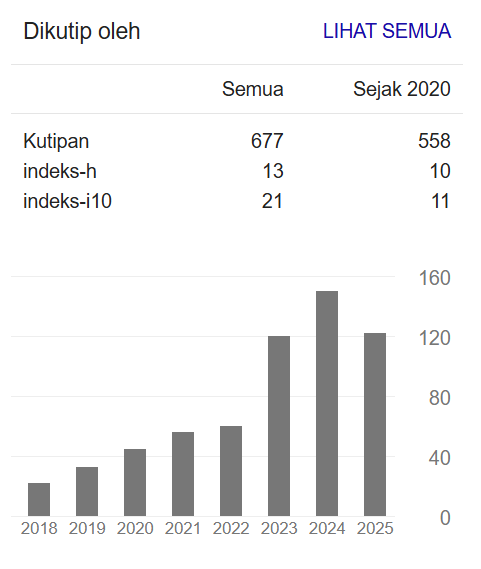ISLAMIC WORLDVIEW IN THE PERSPECTIVE OF M.T.M YAZDĪ AND S.M.N AL-ATTAS AND THEIR IMPLICATION ON ISLAMIZATION OF KNOWLEDGE
DOI:
https://doi.org/10.20871/kpjipm.v9i1.251Keywords:
Islamization of Knowledge, Miṣbāḥ Yazdī, S.M.N. Al-Attas, WorldviewAbstract
The stagnant and even underdeveloped condition of Muslims all over the world has raised concerns among scholars. Many are trying to offer solutions to restore Islamic civilization to its peak. Various proposals lead to the reconstruction of philosophical elements, including epistemology and worldview, to more practical ones, such as the Islamization of knowledge. This study tries to compare the concept of worldview and its implications for the Islamization of knowledge from two major contemporary figures. The two are Syed Muhammad Naquib Al-Attas, a mainstream leader of the Islamization of knowledge from Malaysia, and Ayatullah Muhammad Taqie Miṣbāḥ Yazdī, a neo-Sadrian philosopher from Persia. This research used a qualitative approach, namely the method of literature study to understand the Islamic worldview from the perspective of the two figures and what the implications are for the Islamization of knowledge. The results of the study revealed they both believe in the importance of a genuine worldview as the basis for the reconstruction of Muslims at the individual level and Islam at the level of civilization. However, they adhere to different ontological and epistemological arguments. In Al-Attas, the commitment to sacred texts as well as the interpretation of classical scholars makes the model of Islamization of knowledge tend to be backward and reactionary towards the West. As for Ayatullah Yazdī, prioritizing reason and demonstration has led to a model of Islamization of science that is critical and open for dialogue toward Western science.
Downloads
References
Armas, Adnin. 2018. “Pandangan-Alam Barat dan Islam.” Islamia 12 (1).
Attas, Syed Muhammad Al-Naquib Al-. 1981. Islam dan Sekularisme. Diterjemahkan oleh Khalif Muamma. Bandung: Institut Pemikiran Islam dan Pembangunan Insan (PIMPIN).
Attas, Syed Muhammad Al-Naquib Al-. 1996. Konsep Pendidikan dalam Islam. Diterjemahkan oleh Haidar Bagir. Bandung: Mizan.
Gardaz, Michel. 2003. “The Rise and Fall of Political Islam in Central Asia.” Religion 33 (2): 161–169. https://doi.org/10.1016/S0048-721X(03)00034-4.
Gozali, Mukhtar. 2016. “Agama dan Filsafat dalam Pemikiran Ibnu Sina.” Jaqfi: Jurnal Aqidah dan Filsafat Islam 1 (2): 22–36. https://doi.org/
15575/jaqfi.v1i2.1712.
Guessoum, N. 2010. Islam's Quantum Question: Reconciling Muslim Tradition and Modern Science. London: Bloomsbury Publishing.
Jabiri, Muhammad Abed al-. 2003. Formasi Nalar Arab: Kritik Tradisi Menuju Pembebasan dan Pluralisme Wacana Interreligius. Diterjemahkan oleh Imam Khori. Yogyakarta: IRCiSoD.
Hilmy, Masdar. 2014. “The Double-Edged Sword of Islamic Reform: Muhammadiyah and the Dilemma of “Tajdid” within Indonesian Islam.” Review of Indonesian and Malaysian Affairs 48 (1): 183–206.
Kaushik, Vibha, dan Christine A. Walsh. 2019. “Pragmatism as a Research Paradigm and Its Implications for Social Work Research.” Social Sciences 8 (9): 255. https://doi.org/10.3390/socsci8090255.
Kuru, Ahmet T. Islam, Authoritarianism, and Underdevelopment: A Global and Historical Comparison. Cambridge: Cambridge University Press, 2019.
Lancelin, A. 2004. “Does Progress Have a Future? A Conversation with Pierre-Andre Taguieff.” Queen's Quarterly 111 (4): 515–519.
Machlis, Elisheva. 2022. “Continuity and Change in the Role of Mysticism under the Islamic Republic of Iran.” Sociology of Islam, April, 1–19. https://doi.org/10.1163/22131418-09030002.
March, Andrew F. 2015. “Political Islam: Theory.” Annual Review of Political Science 18 (1): 103–123. https://doi.org/10.1146/annurev-polisci-082112-141250.
Ra’ees, Wahabuddin, dan Abdol Moghset Bani Kamal. 2019. “Human Rights of Religious and Ethnic Minorities in the Islamic Republic of Iran.” Human Rights of Religious and Ethnic Minorities in the Islamic Republic of Iran 4 (Spring): 9–31. https://doi.org/10.26351/JIMES/4/1.
Rahman, Fazlur. 2011. “Islamization of Knowledge: A Response.” Islamic Studies 50 (3/4): 449–457.
Rohman, Abdul, Ahmad Ahmad, Amir Reza, dan Muhammad Ari Firdausi. 2021. “Melacak Makna Worldview: Worldview Barat dan Islam”. Kanz Philosophia: A Journal for Islamic Philosophy and Mysticism 7 (1): 45–64. https://doi.org/10.20871/kpjipm.v7i1.147.
Saat, Norshahril. 2012. “Countering Utopianism: Alatas and the Muslim Resurgence of the 1970s.” Review of Indonesian and Malaysian Affairs 46 (1): 105–125.
Siavoshi, Sussan. 2010. “Āyatullah Misbāh Yazd?: Politics, Knowledge, and the Good Life.” The Muslim World 100 (1): 124–144. https://doi.org/10.1111/j.1478-1913.2009.01308.x.
Yazdi, Muhammad Taqi Misbah. 2005. Pandangan Dunia Ilahi: Menelusuri Doktrin Agama via Akal dan Wahyu. Diterjemahkan oleh Ahmad Marzuki Amin. Qom: Majma Jahani Ahlul Bait.
———.2006. Freedom: Bebas Terpaksa atau Terpaksa Bebas. Diterjemahkan oleh Nailul Aksa. Jakarta: Al-Huda
———. 2021. Kitab Filsafat: Pendekatan Komparatif Filsafat Islam. Diedit oleh Ammar Fauzi. Jakarta: Sadra Press.
Zarkasyi, Hamid Fahmi. 2016. “Islamic Worldview sebagai Paradigma Sains Islam”. Dalam Islamic Science: Paradigma, Fakta dan Agenda, diedit oleh Syamsuddin Arif. Jakarta: INSIST.
Downloads
Published
How to Cite
Issue
Section
License
Copyright (c) 2023 Ahmad Sulaiman

This work is licensed under a Creative Commons Attribution 4.0 International License.





























